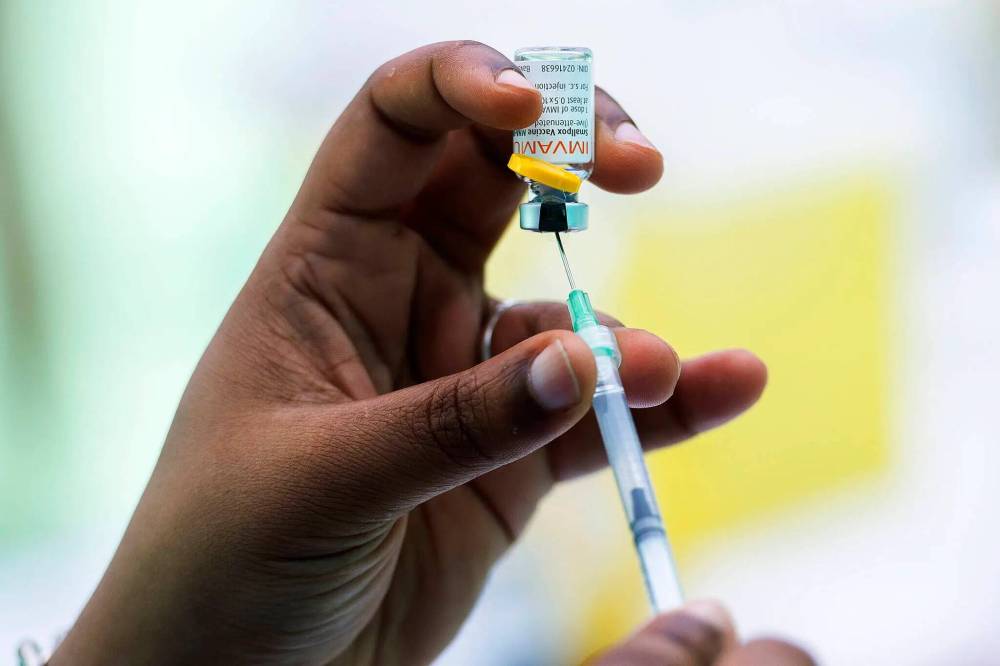Federal officials using Winnipeg lab-developed analysis to monitor wastewater for monkeypox
Advertisement
Read this article for free:
or
Already have an account? Log in here »
To continue reading, please subscribe:
Monthly Digital Subscription
$0 for the first 4 weeks*
- Enjoy unlimited reading on winnipegfreepress.com
- Read the E-Edition, our digital replica newspaper
- Access News Break, our award-winning app
- Play interactive puzzles
*No charge for 4 weeks then price increases to the regular rate of $19.00 plus GST every four weeks. Offer available to new and qualified returning subscribers only. Cancel any time.
Monthly Digital Subscription
$4.75/week*
- Enjoy unlimited reading on winnipegfreepress.com
- Read the E-Edition, our digital replica newspaper
- Access News Break, our award-winning app
- Play interactive puzzles
*Billed as $19 plus GST every four weeks. Cancel any time.
To continue reading, please subscribe:
Add Free Press access to your Brandon Sun subscription for only an additional
$1 for the first 4 weeks*
*Your next subscription payment will increase by $1.00 and you will be charged $16.99 plus GST for four weeks. After four weeks, your payment will increase to $23.99 plus GST every four weeks.
Read unlimited articles for free today:
or
Already have an account? Log in here »
Hey there, time traveller!
This article was published 12/08/2022 (1218 days ago), so information in it may no longer be current.
Canada will soon begin monitoring wastewater to detect the monkeypox virus with new analysis methods developed at the Winnipeg-based National Microbiology Lab.
Dr. Theresa Tam, Canada’s chief public health officer, confirmed federal officials are planning to monitor monkeypox transmission via municipal wastewater samples, after COVID-19 surveillance opened the door for more of that kind of viral tracking.
“The National Microbiology Lab, through their methodologies, have found an approach that, in fact, is quite promising,” Tam said during a virtual technical briefing on monkeypox Friday. “It’s actually quite complicated methodology, but I think we’ve now landed on something that can probably be utilized more broadly.”
New wastewater analysis methods were developed at the Winnipeg-based National Microbiology Lab on 1015 Arlington Street in Winnipeg. (Mike Deal / Winnipeg Free Press files)
Tam couldn’t provide the number of monkeypox vaccine doses the federal government supplied to Manitoba, but she did say the federal government needs to work more closely with provinces on supply and distribution.
The province has also chosen not to reveal its total number of doses. As of Aug. 11, more than 99,000 doses of the Imvamune vaccine have been distributed across Canada, and about half — 50,000 doses — are already administered, she said.
Distribution of the monkeypox vaccine is based on estimates of how many gay and bisexual men are living in each province and territory. Although monkeypox is not a sexually transmitted infection and anyone can get it, the majority of infections around the world are affecting gay and bisexual men.
Tam said about 99 per cent of recorded cases in Canada involve men with a median age of 35. Canada’s vaccine rollout is focusing on providing one dose of vaccine each to men in that highest-risk group.
Most of the Canadian cases are concentrated in Ontario and Quebec, but the federal government relied on national health surveys and individual estimates from provinces to determine how many doses would be needed. Tam said the Ottawa is also tracking weekly vaccine uptake to determine future distribution.
She said she believes Canada currently has a sufficient supply of monkeypox vaccine but acknowledged more doses will have to be secured.
“All I can say is that we have to work closer with the provinces and territories. They’ve each also tried to do these estimates — some of it’s based on health surveys, that’s been conducted over time — but these are, of course, estimates. But I think we got a reasonable sense of what they might be,” she said, adding some provinces are now revising their population estimates of gay and bisexual men.

Chief Public Health Officer Theresa Tam said about 99 per cent of recorded monkeypox cases in Canada involve men with a median age of 35. (Adrian Wyld / The Canadian Press files)
The Free Press requested provincial vaccine supply breakdowns from the federal government, and asked the provincial government about the estimates it supplied to help determine vaccine allocation, but didn’t receive any specifics.
“For this initial request, the province looked at uptake in other Canadian jurisdictions experiencing outbreaks and did not request the entire amount in one allocation,” a provincial spokesperson responded.
It’s important not to stigmatize the gay and bisexual community while paying attention to how the virus is currently spreading, said Bren Dixon, program co-ordinator at the Sexuality Education Resource Centre of Manitoba. The virus spreads with direct physical contact — including sex — and some members of those close-knit communities have been travelling to Pride events in Toronto, Montreal and other cities.
“That’s why it’s hitting this community right now, but we know it won’t stay there,” said Dixon.
He said the resource centre is fielding questions about vaccine supply and support for people who need to self-isolate; the recommended isolation period for monkeypox can be up to four weeks.
“People are also conscious that we’re very happy to have (eligibility) open for our community, but also that we’re not the only at-risk population, and looking at how are we supporting other people?” Dixon said.

As of Aug. 11, more than 99,000 doses of the Imvamune vaccine have been distributed across Canada, and about half — 50,000 doses — are already administered. (The Canadian Press files)
Tam said federal officials are exploring other options — including looking into the idea of stretching supply by administering smaller doses injected just under the skin instead of further into tissue.
That is being done in the U.S. and may, in fact, be more effective, early results suggest
katie.may@winnipegfreepress.com

Katie May is a general-assignment reporter for the Free Press.
Our newsroom depends on a growing audience of readers to power our journalism. If you are not a paid reader, please consider becoming a subscriber.
Our newsroom depends on its audience of readers to power our journalism. Thank you for your support.





